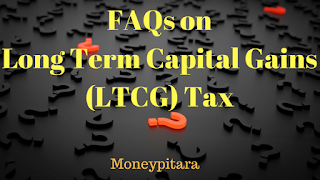FAQs on Long Term Capital Gains (LTCG) Tax
The government of India has
introduced 10 % tax on Long Term Capital Gains
(LTCG) on equity shares and units of equity mutual funds in the budget 2018. The
income arising from the sale of equity or equity mutual funds will be taxed at
10% if the amount of gains is exceeding Rs. 1 lakh. However, the profit earned
up to January 31, 2018, will be grandfathered.
FAQs on Long Term Capital Gains
(LTCG) Tax
Following to the above
budget announcement, the Central Board of Direct Taxes (CBDT) has issued
Frequently Asked Questions (FAQs) regarding taxation of long term capital gains (LTCG) proposed in Finance Bill, 2018. Here
is the summary of some FAQs.
What is the meaning of long term capital gains (LTCG)?
Long term
capital gains (LTCG) mean gains arising from the transfer of long-term capital asset. The proposed new long term capital gains tax shall apply to the
following assets
a) Equity Shares in a
company listed on a recognised stock exchange
b) Unit of an equity
oriented fund
c) Unit of a business trust
What is the point of chargeability of the tax?
The LTCG tax will be applicable
only upon transfer of the long term capital
asset on or after April 1, 2018.
What is the method for calculation of LTCG?
The Long Term Capital Gains will be calculated by subtracting the cost
of acquisition from the sales consideration.
Whether the cost of acquisition will be inflation indexed?
The benefit of inflation
indexation of the cost of acquisition would not be available for calculating
LTCG (long term capital gains) under the
new proposed LTCG tax.
Also read: How to apply for loan against LIC policy online?
Also read: How to apply for loan against LIC policy online?
What is the date of commencement of the new LTCG tax?
The new LTCG tax will be applicable on transfer made on or after April 1,
2018.
What will be the tax treatment of LTCG accrued on or after April 1, 2018?
The long term capital gains (LTCG) exceeding Rs. 1 lakh arising from the
sale of equity or equity mutual funds after April 1, 2018, will be taxed at 10 percent.
What will be the tax treatment of accrued gains up to January 31, 2018?
The gains accrued up to January 31, 2018, will be exempted.
What will be the tax treatment of transfer of equity shares between February 1, 2018, and March 31, 2018?
The transfer made between
February 1, 2018, and March 31, 2018, will be eligible for exemption under
clause (38) of section 10 of the Act.
<
What is the date from which
the holding period will be counted?
<
The holding period will be
counted from the date of acquisition.
Whether tax will be deducted at source in case of gains by the resident tax payer?
No. The tax will not be
deducted at source from the payment of LTCG.
What will be the treatment of long term capital loss arising during the period February 1, 2018, and March 31, 2018?
The long term capital loss arising during the period February 1, 2018, and March 31, 2018, will not be allowed to be set off or carried forward.
What will be the treatment of long term capital loss arising from a transfer made on or after April 1, 2018?
Long term
capital loss arising from a transfer made
on or after April 1, 2018, will be
allowed to be set-off against any other long term
capital gains (LTCG). Unabsorbed loss can be carried forward to subsequent
eight years for set-off against long term
capital gains (LTCG).
You may also like to read: Computation of long term capital gains (LTCG) in different scenarios
You may also like to read: 10 Tax Saving options other than Section 80C
You may also like to read: What is SIP (Systematic Investment Plan)?
You may also like to read: All about ELSS | Equity Linked savings Scheme | Tax saving Mutual Funds
If you liked this article, share it with your friends and colleagues through social media. Your opinion matters, please share your comments.
FAQs on Long Term Capital Gains (LTCG) Tax


No comments:
Post a Comment